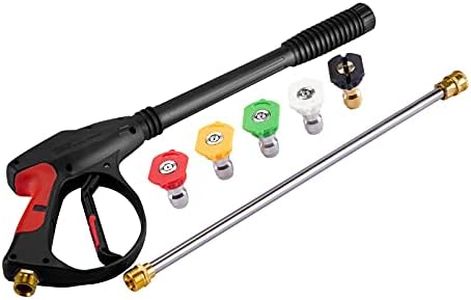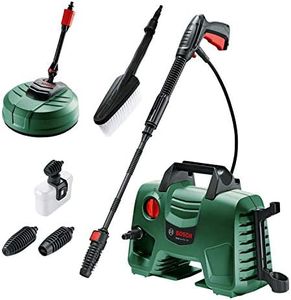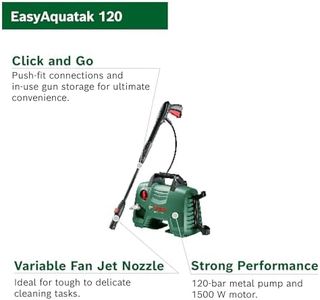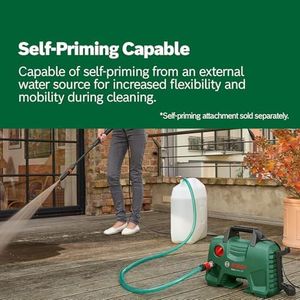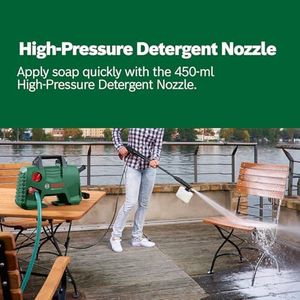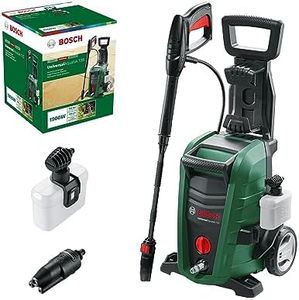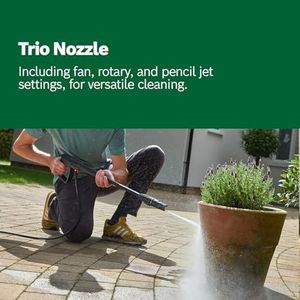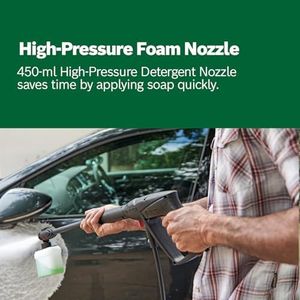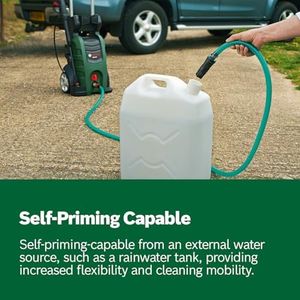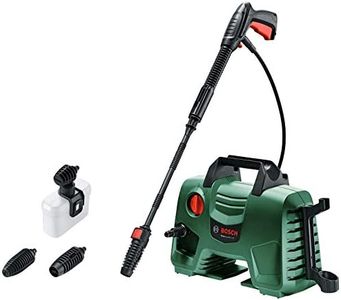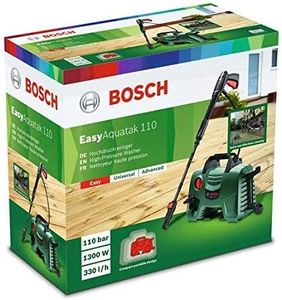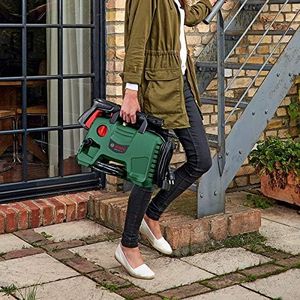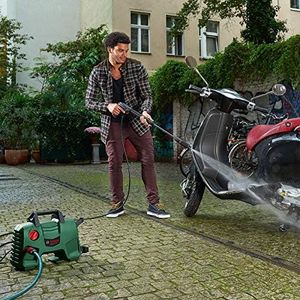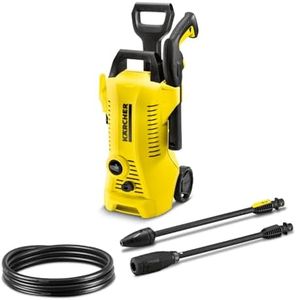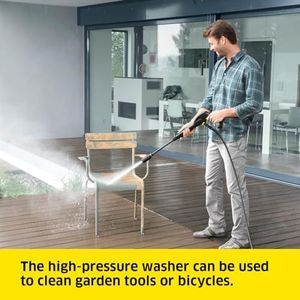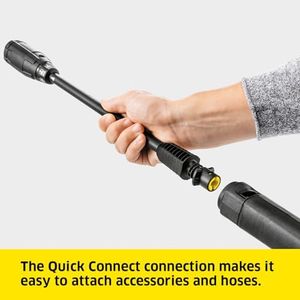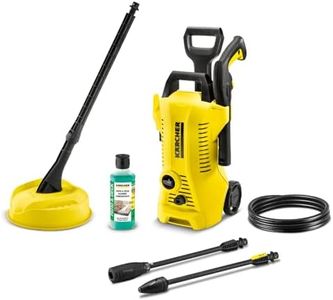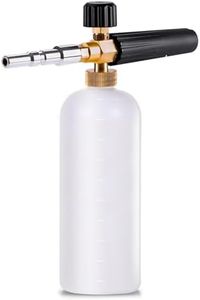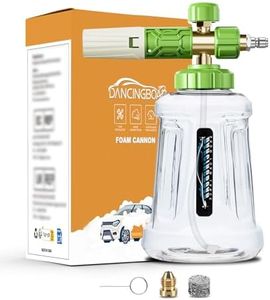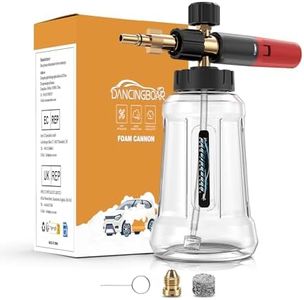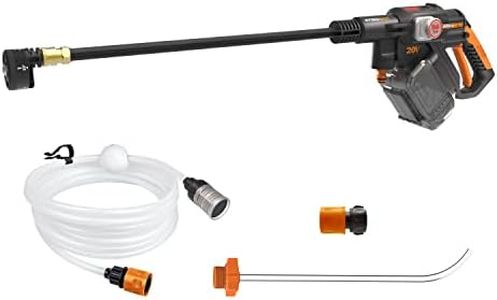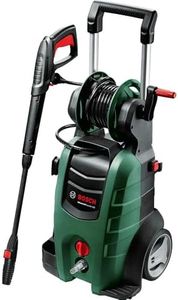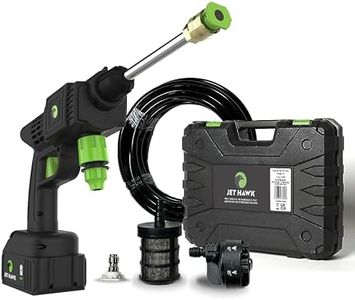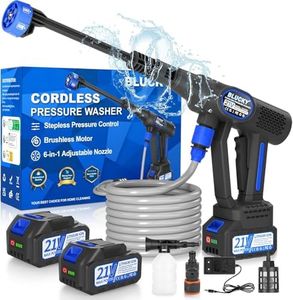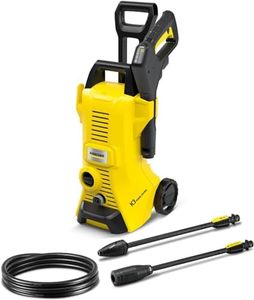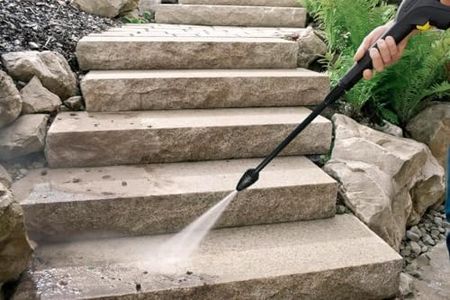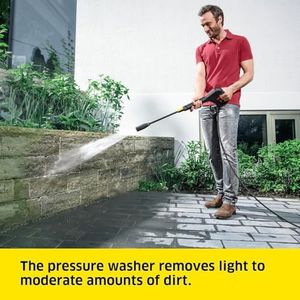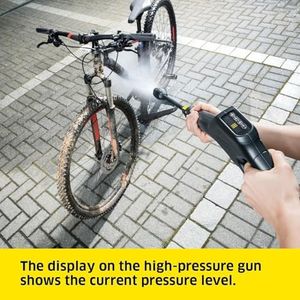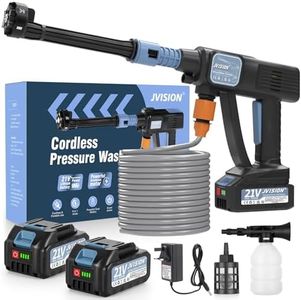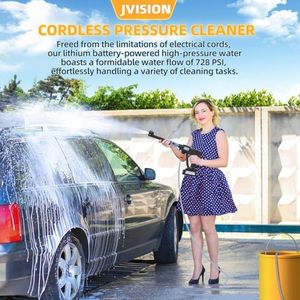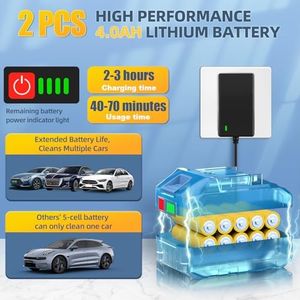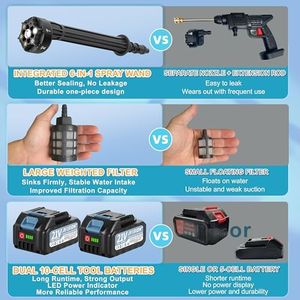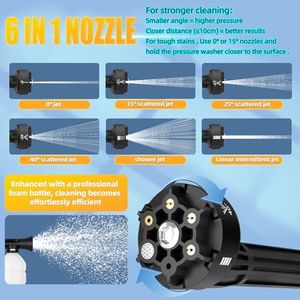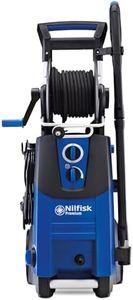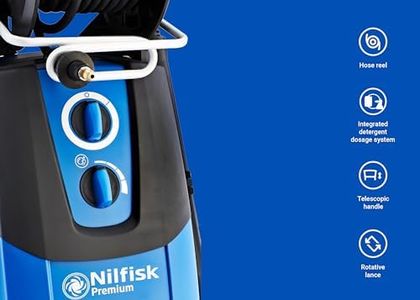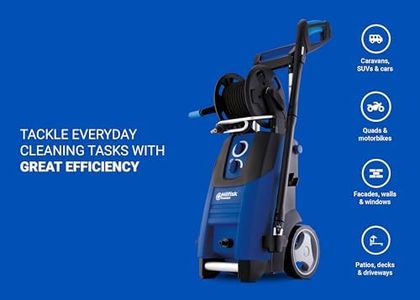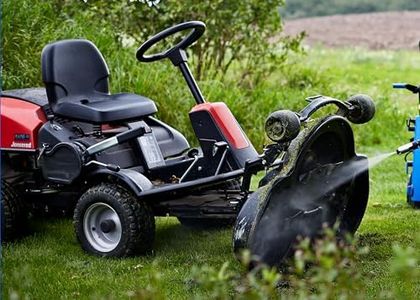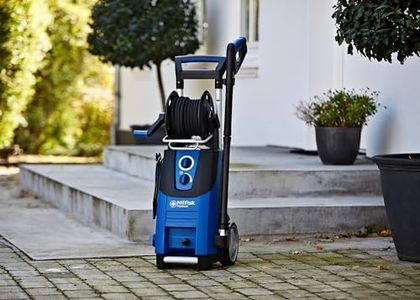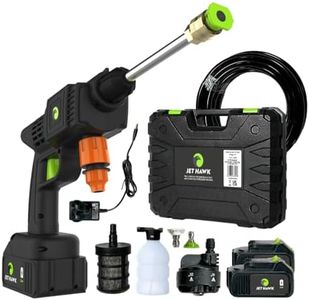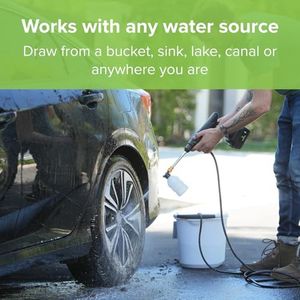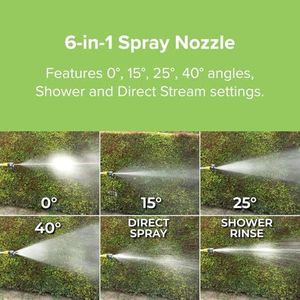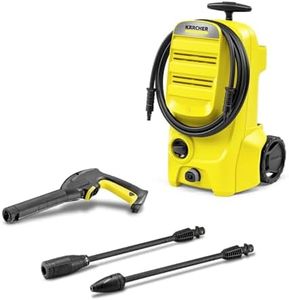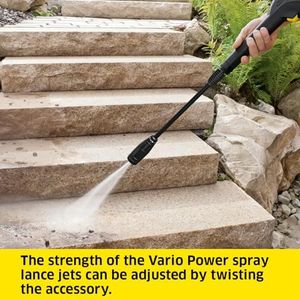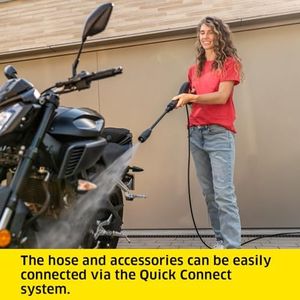We Use CookiesWe use cookies to enhance the security, performance,
functionality and for analytical and promotional activities. By continuing to browse this site you
are agreeing to our privacy policy
10 Best Portable Pressure Washers
From leading brands and best sellers available on the web.By clicking on a link to a third party's website, log data is shared with that third party.
Top 10 Best Portable Pressure Washers 2026 in the UK
#1
Winner
Bosch High Pressure Washer EasyAquatak 120 (1500W, Home and Car Kit Included, Max. Flow Rate: 350l/h, in Cardboard Box) - Amazon Exclusive
Bosch High Pressure Washer EasyAquatak 120 (1500W, Home and Car Kit Included, Max. Flow Rate: 350l/h, in Cardboard Box) - Amazon Exclusive
Pressure (PSI): 1740
Water Flow Rate (GPM): 1.5 GPM
Power Source: Corded Electric
Portability: 5.1 kg, compact, lightweight
Nozzle Options: variable fan, rotary, detergent nozzles
Hose Length: 5 Metres
Chosen by 1371 this week
Bosch High Pressure Washer UniversalAquatak 135 (1900 W, 135 Bar Pressure, 450 l/h Flow Rate, with 3-in-1 Nozzle, Detergent Nozzle, and Carrying Handle in Carton Packaging)
Bosch High Pressure Washer UniversalAquatak 135 (1900 W, 135 Bar Pressure, 450 l/h Flow Rate, with 3-in-1 Nozzle, Detergent Nozzle, and Carrying Handle in Carton Packaging)
Pressure (PSI): 1950 PSI
Water Flow Rate (GPM): 1.98 GPM
Power Source: Corded Electric
Portability: 6.5 kg, pull-out and carry handles
Nozzle Options: 3-in-1 and detergent nozzles
Hose Length: 7 Metres
Bosch high pressure washer EasyAquatak 110 (compact design, 110-bar pump, 450-ml High-Pressure Detergent Nozzle, push-fit connections, in-use gun storage, accessory storage)
Bosch high pressure washer EasyAquatak 110 (compact design, 110-bar pump, 450-ml High-Pressure Detergent Nozzle, push-fit connections, in-use gun storage, accessory storage)
Pressure (PSI): 110
Water Flow Rate (GPM): 1.45
Power Source: Corded Electric
Portability: Portable
Nozzle Options: Variable, rotary, high-pressure detergent
Hose Length: 3
Kärcher K 2 Power Control pressure washer, pressure: max. 110 bar, flow rate: 360 l/h, area coverage: 20 m²/h, water filter, weight: 4.0 kg, high-pressure hose and gun, dirt blaster, spray lance
Kärcher K 2 Power Control pressure washer, pressure: max. 110 bar, flow rate: 360 l/h, area coverage: 20 m²/h, water filter, weight: 4.0 kg, high-pressure hose and gun, dirt blaster, spray lance
Pressure (PSI): 1600 PSI
Water Flow Rate (GPM): 360 Litres/Hour
Power Source: AC
Portability: 4 kg
Nozzle Options: Vario Power lance, dirt blaster
Hose Length: 5 Metres
Kärcher K 2 Power Control Home pressure washer, pressure: max. 110 bar, flow rate: 360 l/h, area: 20 m²/h, water filter, weight: 4.0 kg, high-pressure gun, dirt blaster, spray lance, Home Kit
Kärcher K 2 Power Control Home pressure washer, pressure: max. 110 bar, flow rate: 360 l/h, area: 20 m²/h, water filter, weight: 4.0 kg, high-pressure gun, dirt blaster, spray lance, Home Kit
Pressure (PSI): 1600
Power Source: AC
Portability: 4 kg
Nozzle Options: Vario Power lance, dirt blaster
Hose Length: 5 Metres
Kärcher K 3 Power Control pressure washer, pressure: max. 120 bar, flow rate: 380 l/h, area coverage: 25 m²/h, water filter, weight: 4.4 kg, high-pressure hose and gun, dirt blaster, spray lance
Kärcher K 3 Power Control pressure washer, pressure: max. 120 bar, flow rate: 380 l/h, area coverage: 25 m²/h, water filter, weight: 4.4 kg, high-pressure hose and gun, dirt blaster, spray lance
Pressure (PSI): 1740
Water Flow Rate (GPM): 1.0
Power Source: AC
Portability: Lightweight, compact, 4.4 kg
Nozzle Options: Dirt blaster, vario lance
Hose Length: 7 Metres
Cordless Pressure Washer, Portable Power Washer for Patio & Car, 6 in 1 Battery-Operated System with 5M Hose, Jet Wash Tool with Dual Batteries, High-Pressure Cordless Jet Cleaner
Cordless Pressure Washer, Portable Power Washer for Patio & Car, 6 in 1 Battery-Operated System with 5M Hose, Jet Wash Tool with Dual Batteries, High-Pressure Cordless Jet Cleaner
Water Flow Rate (GPM): 1.32
Power Source: Battery
Portability: Portable
Nozzle Options: 6-in-1 lance
Hose Length: 5 Metres
Nilfisk Premium 180 Bar Pressure Washer - High Performance Power Washer for Workshops, Patios and Cars (2900 W)
Nilfisk Premium 180 Bar Pressure Washer - High Performance Power Washer for Workshops, Patios and Cars (2900 W)
Pressure (PSI): 2610 PSI
Power Source: Corded Electric
Nozzle Options: multiple nozzles and foam sprayer
Hose Length: 10 Metres
Jet Hawk Cordless High-Pressure Washer Bundle in Green - Lightweight Portable Jet Wash - Any Water Source - Various Spray Nozzles, Soap Dispenser, 5m Hose & Connector, Carry Case & Additional Battery
Jet Hawk Cordless High-Pressure Washer Bundle in Green - Lightweight Portable Jet Wash - Any Water Source - Various Spray Nozzles, Soap Dispenser, 5m Hose & Connector, Carry Case & Additional Battery
Power Source: Battery Powered
Portability: Cordless, battery-powered, lightweight, portable
Nozzle Options: 6-in-1 multi-nozzle
Hose Length: 5 Metres
#10
Kärcher K 3 Classic pressure washer, pressure: max. 120 bar, flow rate: 380 l/h, area coverage: 25 m²/h, water filter, weight: 4.2 kg, high-pressure hose and gun, dirt blaster, spray lance
Kärcher K 3 Classic pressure washer, pressure: max. 120 bar, flow rate: 380 l/h, area coverage: 25 m²/h, water filter, weight: 4.2 kg, high-pressure hose and gun, dirt blaster, spray lance
Pressure (PSI): 1740 PSI
Water Flow Rate (GPM): 1.68 GPM
Power Source: Corded Electric
Portability: 5.26 kg
Nozzle Options: Vario Power, Dirt Blaster
Hose Length: 6 Metres
Buying Guide for the Best Portable Pressure Washers
When choosing a portable pressure washer, it's important to consider how you plan to use it. Whether you're cleaning your car, patio, or outdoor furniture, the right pressure washer can make the job easier and more efficient. Understanding the key specifications will help you select a model that meets your needs without overpaying for features you won't use.Pressure (PSI)PSI stands for pounds per square inch and measures the water pressure produced by the washer. This is important because higher PSI means more cleaning power. For light tasks like washing cars or outdoor furniture, a PSI of 1300-1800 is usually sufficient. For tougher jobs like cleaning driveways or removing stubborn dirt, you might need a PSI of 2000-3000. Consider what you'll be cleaning most often to determine the right PSI for you.
Water Flow Rate (GPM)GPM stands for gallons per minute and indicates how much water the washer uses. A higher GPM means more water is used, which can help rinse away dirt faster. For general household cleaning, a GPM of 1.2-1.5 is typically adequate. If you need to clean larger areas or more stubborn grime, look for a model with a higher GPM. Balance your need for efficiency with water conservation.
Power SourcePortable pressure washers can be powered by electricity or gas. Electric models are quieter, lighter, and require less maintenance, making them ideal for small to medium tasks around the home. Gas models are more powerful and better suited for heavy-duty cleaning but are noisier and require more upkeep. Consider where you'll be using the washer and whether you have easy access to power outlets.
PortabilityPortability is crucial for a portable pressure washer, as it determines how easily you can move it around. Look for features like wheels, a handle, and a compact design. If you plan to transport the washer frequently, a lighter model with a sturdy handle will be more convenient. Consider the weight and size in relation to your physical capabilities and storage space.
Nozzle OptionsDifferent nozzles provide different spray patterns and pressures, which can be useful for various cleaning tasks. Common options include a 0-degree nozzle for concentrated power, a 15-degree nozzle for tough stains, and a 40-degree nozzle for gentle cleaning. Some models come with adjustable nozzles or quick-connect tips for versatility. Think about the types of surfaces you'll be cleaning and choose a washer with the appropriate nozzle options.
Hose LengthThe length of the hose affects how far you can move from the water source while cleaning. A longer hose provides more flexibility and reach, which is useful for larger areas. However, longer hoses can be more cumbersome to manage. Consider the size of the area you'll be cleaning and whether you'll need to move around obstacles.
